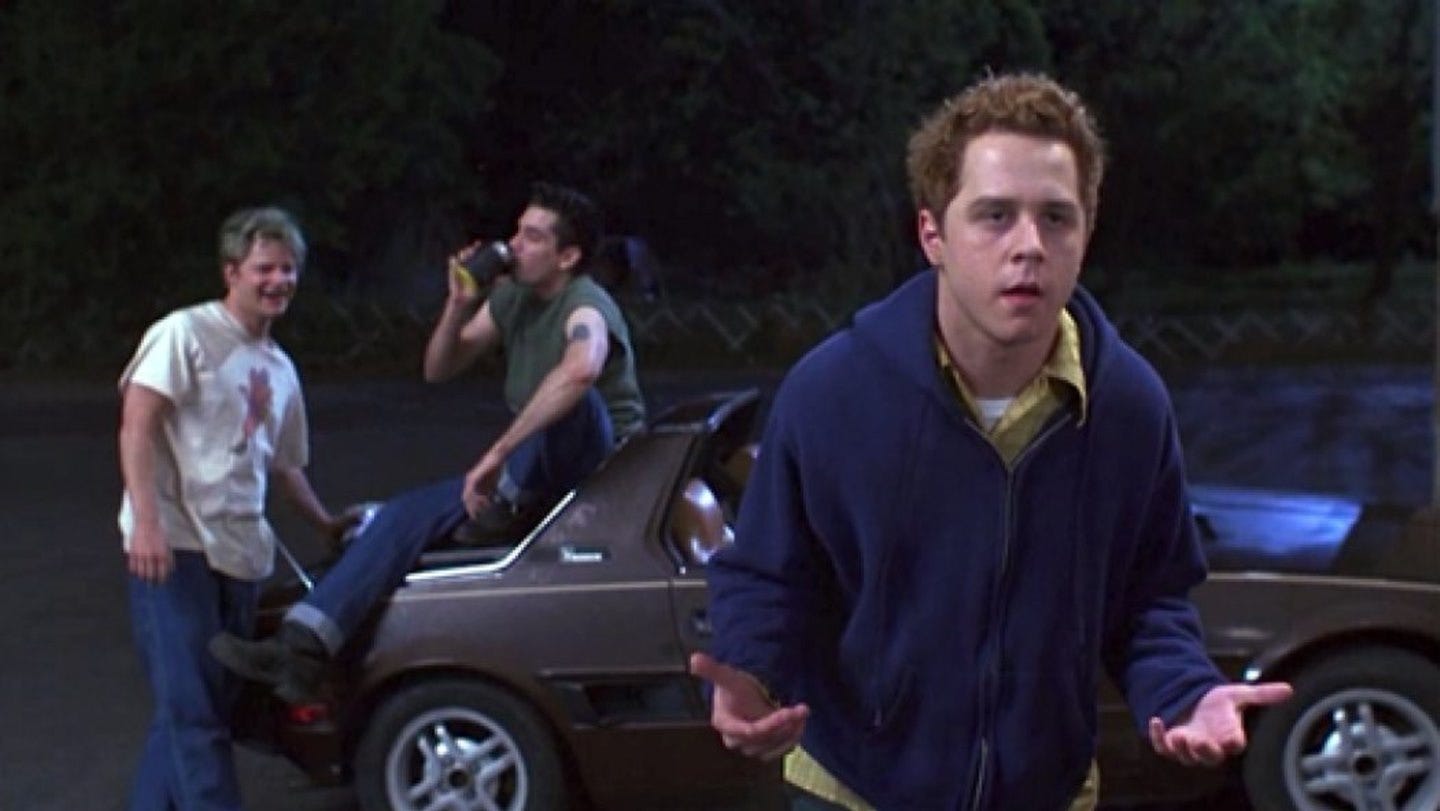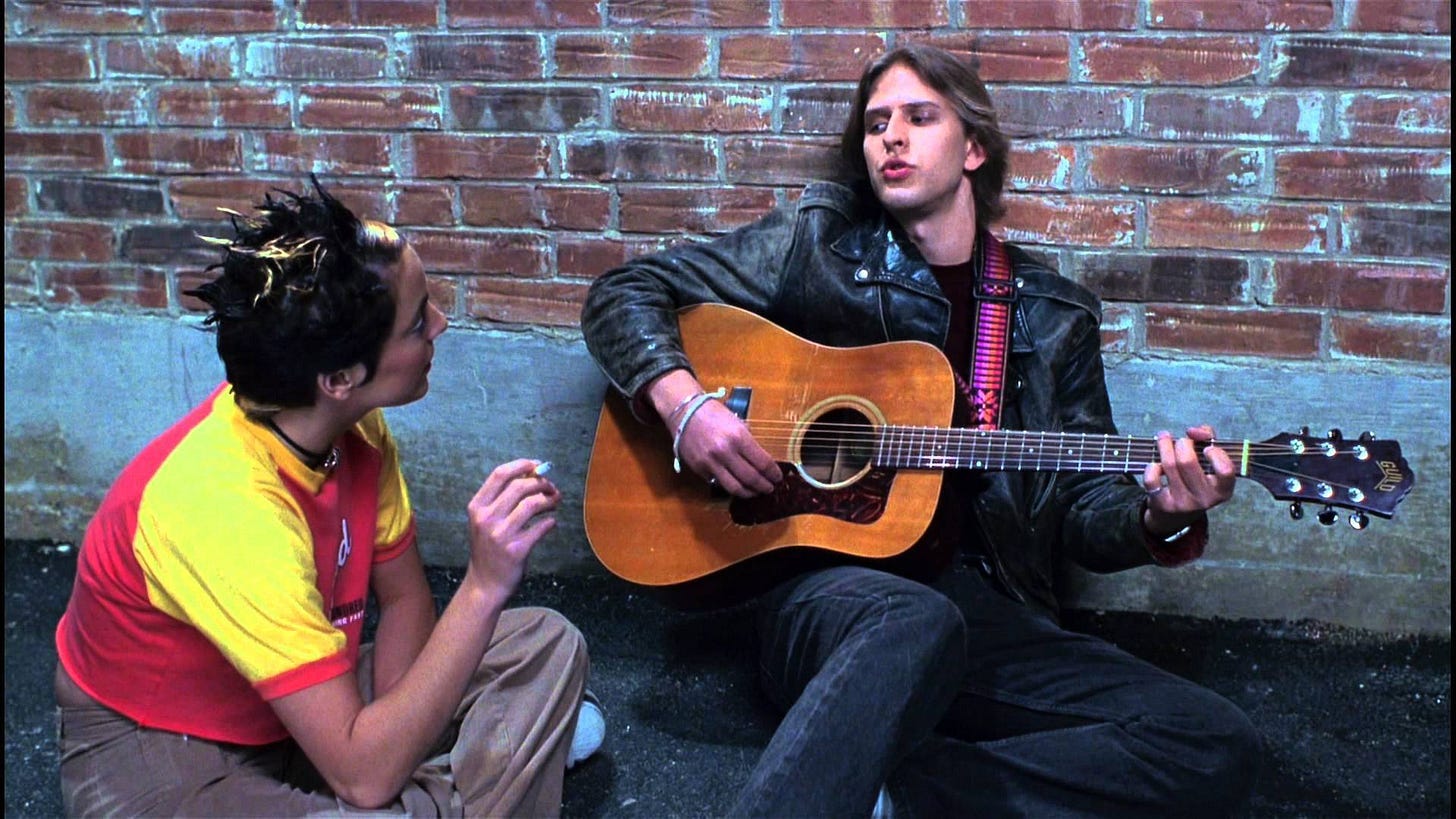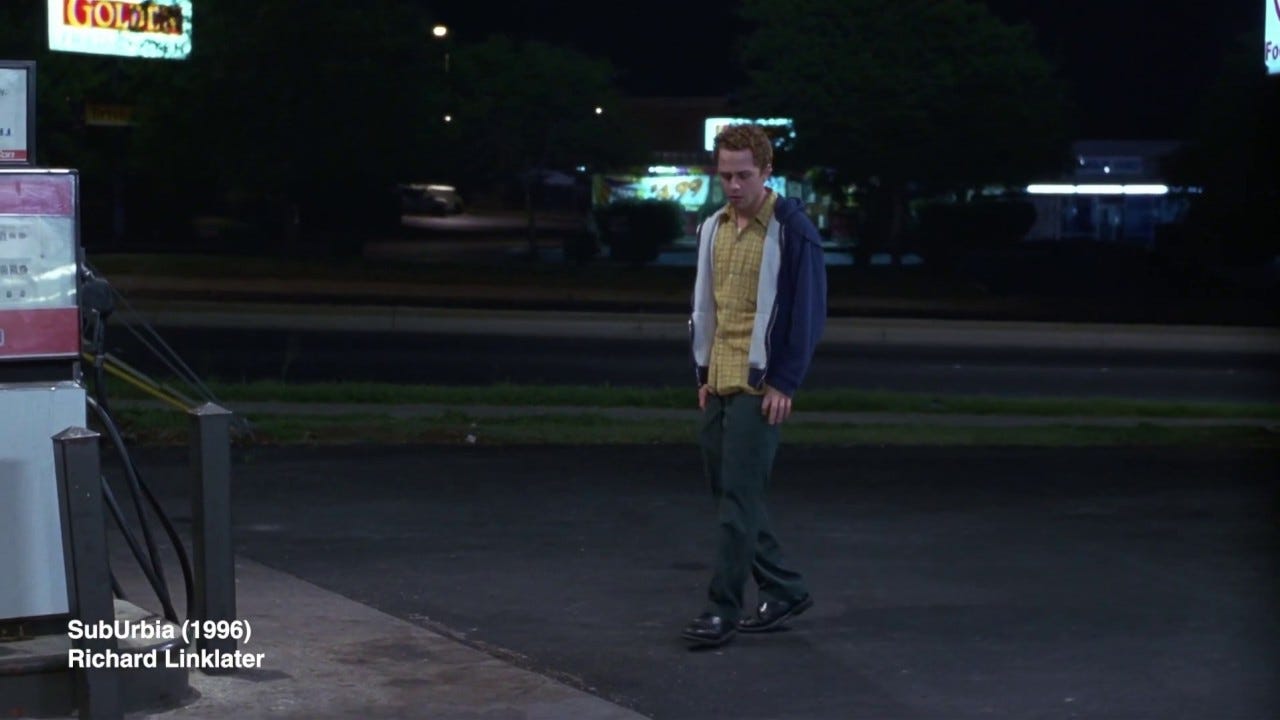A Parking Lot is an Island: Some Thoughts on Richard Linklater’s Suburbia (1996)
Linklater exists in the cultural mind as a filmmaker known for, among other films, hazy hangout pictures. Films like Dazed and Confused, Slacker, and Everybody Wants Some are shambolic and temporally restrictive films, generally focused on youthful, rebellious, and likable characters and brief glimpses of their interpersonal dynamics over one day or one weekend. Dazed and Confused and Everybody Wants Some both evoke a sense of nostalgia through their classic rock or early hip-hop/new wave soundtracks and attention to period detail but behind this nostalgia is a sense of pyrrhic victories and melancholy. Take Pink who refuses to play football his senior year towards the end of Dazed and Confused. The all-nighter is over, it fades to the earliest morning hours with the dew still on the grass– he refuses to conform to the old guard by being the Texas hotshot Senior QB. During the film’s final scene, Pink and his friends are seen cruising on the Texas roads on a sunny summer morning, driving to get concert tickets while Foghat’s “Slow Ride” blares. The ending is a moment of freedom but there’s that undercurrent lurking beneath said freedom: “The good times are here, but for how long?” Even if we are only restricted to a short sliver of their life, we get the idea these characters genuinely continue to exist beyond the allotted time of the film’s narrative or beyond what the camera captures– for better or for worse.
This makes Suburbia, Richard Linklater’s 1996 film about slackers adrift and stuck in a mid-sized town in Texas, an interesting outlier of these conventions. It has many of the trademark Linklater-isms: a cast consisting mostly of mostly young socially rebellious individuals, a great soundtrack of period-appropriate music (including an incredibly appropriate score from Thurston Moore), and a short temporal plot (unfolding during one long night into the next morning). Suburbia, however, is notably different in its tone despite holding many of Linklater’s directorial conventions. Gone are the rebels with a heart of gold, living the best days of their lives– instead we are subjected to a glimpse of the small town bitter and petty misanthropes of Gen X.
Suburbia’s shift in tone makes a lot of sense given that it is an adaptation of a stage play from Eric Bogosian, known for his portrayals of unsavory characters in both his acting and literary pursuits. The film moves from the play’s geography of New Jersey suburbs to Texas. Jersey and the east coast at large are geographically tight. Going to the University of Delaware, I am within a 2.5-hour drive of four of the largest cities on the east coast and if you expand the parameters to 5.5 hours you can include Boston, Pittsburgh, Richmond, or the Virginia Beach area. In contrast, Texas has a sprawl that is apparent even visiting its more populated areas. Sure the four largest cities are geographically close but if you go far west enough there are dozens of hours of arid desert and empty roads. Go far east enough– it's the marsh and swaps of the Gulf for a half dozen hours until you reach the next major metropolitan area. Bogosian’s own stage drama differs considerably beyond location or geography. Characters in the play are more concerned with sticking it to the man, appropriating the worst tendencies of every early twenties anarchist like thinking an immigrant 7/11 who works at is a fascist by working for “the man”. It's a good play and Linklater does a solid job of adapting its larger strokes for the screen but substitutes the location’s flavor from the claustrophobia of the east coast suburbia in Bogosian’s play for the sprawl and ennui of Texas.
It’s a weirdly dissonant film and maybe the meanest thing Linklater has had his hand in directorially, I don’t really think there’s a remotely sympathetic character in this film besides Nazeer, who is given a decent bit of texture by Ajay Naidu. He’s a whip-smart convenience store, angry that he has to deal with maybe the most grating white Gen X slackers on the planet as we see them loitering while blasting Ministry and crushing beers in the parking lot– an indication of towns with no shared spaces besides places to simply park cars or buy groceries. The film’s central conflict revolves around four characters reacting to Pony, a musician with a record deal who is visiting town. The concept of “the guy who hit it big coming back home” is a trope that isn’t necessarily original– but it's how well the contempt is played by the townies and is accentuated by Joyce Bartok doing a great Keith Carradine in Nashville impression. His manager is given a quintessentially perfect but more subdued Parker Posey role, channeling her other performances’ normally baroque sense of narcissism into a charming yet elitist coastal-ite.
The character who most resents Pony is Giovanni Ribisi’s Jeff. Ribisi gives a great turn as a sniveling pseudo-intellectual– a guy who thinks he’s better than everyone around him but can’t finish any of his lofty, half-baked creative endeavors and didn’t even finish community college but fancies himself an intellectual– a criminal underachiever who takes out his mix of neurotic self-pity and delusions of grandeur onto others who seem to have it “figured out” more than him. Imagine George Costanza with charisma dialed from a ten to a one. We get other glimpses of figures in this town– Steve Zahn’s slackerism id, the self-destructive alcoholism of Nicky Katt’s former military discharge, or Sooze's (Amie Carrie) acute yet condescending sense of social consciousness. These are similar environments as Linklater's previous films (Suburbia was filmed in Austin like most of his filmography) but instead of the sense of eccentric-ism or living identity, a smaller cast of characters are presented as being lost, sad, and unsure of what’s to come or lacking any sense of upward mobility or chance of getting out but also sufficient enough to be able to survive (white, middle class) and maintain a banal status quo. It parrots just about every empty anti-authority rebel yell that was so essential to Gen X. However the moments that stick out in my mind the most are the establishing shots or ellipses of anonymous overpasses and neighborhoods or giant Miller Lite billboards, all set to the lonely and dissonant twang of Thurston Moore’s score, a simple mix of sound and image. Everything looks and seems so far from anything that matters.
I’m still really not sure if I fully love Suburbia but I do think about it a lot. Its smaller cast and strange bitter energy certainly leave it with less of an infectiously engaging energy than other Linklater films but something about its rage strikes me as a fascinating time capsule. I was talking to a friend not too long ago about Oliver Stone’s Natural Born Killers. At face value it is a movie that seems to be provocative for the sake of it– but, as Matt Lynch says in his review of the film, whatever it seems to be mad at has long since faded away. It’s an excellent encapsulation of the adverse side effects of Francis Fukuyama’s hilariously idealistic “End of History” concept in the same way as the films of Todd Solondz or Terry Zwigoff are, a snapshot of the angst and ennui of this strange era after the fall of the Berlin Wall but before 9/11. The west won so what is there to do now? It serves best as a darker negative of Linklater’s other hangout films. Dazed and Confused, or any of his other films of this blueprint, the sense is given these characters have so much more life to live beyond the camera– which you are supposed to cheer for. In Suburbia, yes, these characters live beyond the screen but none of them are happy about where or who they are. I’m still not sure if I find this grungy angst fully affecting or completely misguided but it hasn’t left my head much in these last few months. It has that undercurrent of melancholy or doubt that is usually under the surface of Linklater’s other movies but instead brings it above sea level onto the unsuspecting eye. The parking lots are empty and there’s nowhere else you can go. Are these even the good times?





